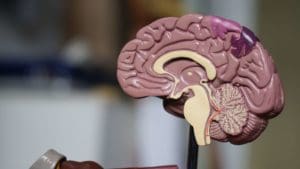Traumatic brain injury can lead to lifelong physical, cognitive, and behavioral changes, impacting one’s ability to think, communicate, and connect with others.
This article will help you understand the challenges that patients with brain injury face and show you how you can get help to prevent PCS caregiver burnout and how support groups for brain injury caregivers can help.

Physical Changes for Someone with Brain Injury
Traumatic brain injury (TBI) is caused by a bump, a blow, or a jolt to the head that disrupts the normal function of the brain. Any brain injury, whether mild or severe, can cause a range of physical changes.
Weakness
Weakness and fatigue are common consequences of traumatic brain injury since the body requires lots of energy for healing. They usually get better over time, but may persist in some patients.
Muscle coordination problems
Damage of nerve cells in the part of the brain that controls muscle coordination may cause a lack of muscle control, eye movement problems, as well as chewing and swallowing difficulties.
Full or partial paralysis
Paralysis results from damage in the areas of the brain responsible for muscle function. In some cases, it’s possible to restore communication between the brain and muscles and regain movement.
Sensory impairment
Sensory issues are common after brain injury. The person with TBI may experience:
- Sensitivity to noise
- Oversensitivity to touch
- Loss of vision, double or blurry vision
- Hearing problems and tinnitus
- Changes in taste and smell.
Seizures
TBI-related seizures are due to abnormal electrical activity in the brain and can cause the body to shake or become unresponsive for shorter periods of time. Seizures typically occur during the first week after a brain injury, but may also appear months or years later.
Sleep problems
Brain injuries are often accompanied by changes in sleep patterns, as well as trouble falling and staying asleep. However, most people with TBI resume a normal sleep routine over time.
Speech difficulties
Some patients have difficulties communicating after a brain injury. They may develop speech-related problems such as:
- Inability to make sounds
- Difficulty pronouncing words or phrases
- Difficulty finding the right words
- Inability to understand speech
- Loss of language and ability to communicate.

Cognitive Changes for Someone with Brain Injury
Because various cognitive abilities are located in different parts of the brain, a brain injury may affect only some of the cognitive skills such as learning, memory, or problem solving.
Shortened attention span
People with lingering symptoms of a brain injury are often restless and easily distracted. This can result in difficulty working on more than one task and inability to carry longer conversations, for example.
Memory problems
Problems with memory, particularly short-term memory, are common after brain injury. People with TBI frequently have trouble learning and remembering new information, although they are usually able to remember events that happened in the past.
Problem-solving difficulties
Problem-solving is a complex cognitive skill that may be affected by brain injury. As a result, patients may have difficulties with:
- Analyzing information
- Considering different solutions
- Evaluating the information needed to make decisions.
Poor judgment
Individuals with brain injury may make quick decisions without thinking about the consequences or fail to evaluate safe versus unsafe behavior and actions.
Reading and writing difficulties
People with brain injuries sometimes encounter partial or complete loss of reading and writing skills, such as not being able to understand written text or immediately forgetting what was read or written. Reading and writing may also cause headaches and extreme fatigue.
Language problems
A brain injury may cause challenges when it comes to understanding and expressing information, for example:
- Difficulty finding the right word
- Trouble following conversations
- Misunderstanding jokes or sarcasm.
Inability to understand abstract concepts
Reasoning and abstract thinking skills are often affected by brain injury. Some of the common difficulties seen after brain injury include:
- Not grasping metaphorical language
- Not following reasoning during discussions
- Not being able to generalize solutions and ideas to new situations.
Difficulty learning new things
People with brain injury may have trouble remembering and learning new information.

Behavior Changes for Brain Injury Survivors
Behavior changes in people with TBI originate not only from physiological alterations in the brain that affect processing the information, but also from their emotional reactions to the challenges caused by the injury.
Difficulty with social skills
People with brain injury may display social skill challenges such as lack of sensitivity for the feelings of others, ignoring acceptable modes of conduct, and the use of vulgar language or behavior.
Inability to empathize with others
Some people with brain injuries lack empathy, which may result in making hurtful remarks or unreasonable demands.
Tendency to be self-centered
Many TBI patients tend to develop a more self-centered personality due to damage to the frontal lobes of the brain.
Inability to control emotions
After a brain injury, a person may lack emotional responses such as smiling, laughing, or crying, or their responses may be inappropriate.
Increases in irritability and frustration
Injury to the parts of the brain that control emotional expression may affect a patient’s mood, making them depressed, angry, or irritable.
Inappropriate and/or aggressive behavior
One of the most common personality changes after a head injury is inappropriate and aggressive behavior that can manifest itself in yelling, using foul language, and throwing objects.
Extreme mood swings
Neurological damage can cause mood swings, unexpected display of emotions, and extreme reactions to everyday situations such as sudden angry outbursts of laughter. This loss of control over emotional responses is known as emotional lability.
Depression
Depression in individuals with brain injury often appears during the later stages of recovery, once they have become more aware of their situation.
The impact of a brain injury is life-changing not only for patients, but also for their families and caregivers. Here’s what you may expect to feel as a caregiver of a person with brain injury.
What Caregivers Feel When Taking Care of a Patient with a Brain Injury
Brain injuries are among the most devastating types of injuries, causing the person to think and behave in a different way than before. Providing care and support to brain injury patients is often a very demanding task and most caregivers will at some point feel lonely, anxious, depressed, or angry while caring for their family members.
Getting Help
If you’re caring for someone with TBI, it’s important to seek support to prevent caregiver burnout. Here are some tips on how to get the help you need:
- Accept assistance of family, friends, local resources, or respite care.
- Join a support group that will help you feel less alone.
- See a doctor—you won’t be able to help your loved one if you aren’t feeling well yourself.
- See a therapist who will help you adjust to your loved one’s life changes post-injury.
- Make time for self care and activities you enjoy.

What to Look For in a Brain Injury Caregiver Support Group
Joining a caregiver support group will enable you to exchange ideas in a confidential atmosphere without judgment, share information, and connect to others in a safe space. Here’s what to look for when choosing a support group:
- A professional group and leader with suitable skills and training
- A group with experience rather than a new one that may dissolve quickly
- A group with clear goals and overall focus
- A group specifically geared toward brain injury caregivers rather than caregiving in general.
Share This Article